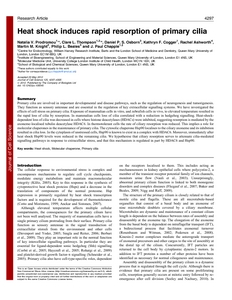Prodromou, NV; Thompson, CL; Osborn, DP; Cogger, KF; Ashworth, R; Knight, MM; Beales, PL; Chapple, JP
(2012)
Heat shock induces rapid resorption of primary cilia.
JOURNAL OF CELL SCIENCE, 125 (18).
4297- 4305.
ISSN 0021-9533
https://doi.org/10.1242/jcs.100545
SGUL Authors: Osborn, Daniel Peter Sayer
![[img]](https://openaccess.sgul.ac.uk/103652/1.hassmallThumbnailVersion/103652.pdf)  Preview |
|
["document_typename_application/pdf; charset=binary" not defined]
Published Version
Download (3MB)
| Preview
|
Abstract
Primary cilia are involved in important developmental and disease pathways, such as the regulation of neurogenesis and tumorigenesis. They function as sensory antennae and are essential in the regulation of key extracellular signalling systems. We have investigated the effects of cell stress on primary cilia. Exposure of mammalian cells in vitro, and zebrafish cells in vivo, to elevated temperature resulted in the rapid loss of cilia by resorption. In mammalian cells loss of cilia correlated with a reduction in hedgehog signalling. Heat-shock-dependent loss of cilia was decreased in cells where histone deacetylases (HDACs) were inhibited, suggesting resorption is mediated by the axoneme-localised tubulin deacetylase HDAC6. In thermotolerant cells the rate of ciliary resorption was reduced. This implies a role for molecular chaperones in the maintenance of primary cilia. The cytosolic chaperone Hsp90 localises to the ciliary axoneme and its inhibition resulted in cilia loss. In the cytoplasm of unstressed cells, Hsp90 is known to exist in a complex with HDAC6. Moreover, immediately after heat shock Hsp90 levels were reduced in the remaining cilia. We hypothesise that ciliary resorption serves to attenuate cilia-mediated signalling pathways in response to extracellular stress, and that this mechanism is regulated in part by HDAC6 and Hsp90.
| Item Type: |
Article
|
| Additional Information: |
© 2012. Published by The Company of Biologists Ltd.
This is an Open Access article distributed under the terms of the Creative Commons Attribution Non-Commercial Share Alike License (http://creativecommons.org/licenses/by-nc-sa/3.0/), which permits unrestricted non-commercial use, distribution and reproduction in any medium provided that the original work is properly cited and all further distributions of the work or adaptation are subject to the same Creative Commons License terms. PubMed ID: 22718348 |
| Keywords: |
Animals, Axoneme, Cilia, HSP90 Heat-Shock Proteins, Heat-Shock Response, Hedgehog Proteins, Histone Deacetylases, Humans, Mice, NIH 3T3 Cells, Protein Transport, Signal Transduction, Temperature, Zebrafish, Science & Technology, Life Sciences & Biomedicine, Cell Biology, Heat shock, Molecular chaperone, Primary cilia, CELL, ACTIVATION, ORGANELLE, DISEASE, STRESS, HSP90, PATHWAYS, FACTOR-1, TUBULIN, SURFACE |
| SGUL Research Institute / Research Centre: |
Academic Structure > Molecular and Clinical Sciences Research Institute (MCS)
Academic Structure > Molecular and Clinical Sciences Research Institute (MCS) > Cell Sciences (INCCCS) |
| Journal or Publication Title: |
JOURNAL OF CELL SCIENCE |
| ISSN: |
0021-9533 |
| Related URLs: |
|
| Web of Science ID: |
WOS:000310796800014 |
| Dates: |
| Date |
Event |
| 2012-09-15 |
Published |
|
 |
Download EPMC Full text (HTML)
|
| URI: |
https://openaccess.sgul.ac.uk/id/eprint/103652 |
| Publisher's version: |
https://doi.org/10.1242/jcs.100545 |
Statistics
Item downloaded times since 19 Dec 2013.
Actions (login required)
 |
Edit Item |


